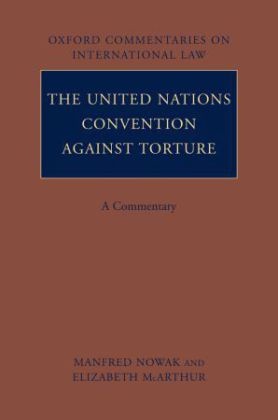Read more
Professor Manfred Nowak is Director of the Boltzmann Institute of Human Rights, Professor of International Human Rights, University of Vienna, UN Special Rapporteur on Torture, and a former Judge of the Human Rights Chamber for Bosnia and HerzegovniaElizabeth McArthur is a research assistant at the Boltzmann Institute of Human Rights and a former Human Rights Officer with the OSCE Office for Democratic Institutions and Human Rights This book explores the definition of torture in the United Nations Convention Against Torture, the obligations of States parties and provisions for international monitoring. Full commentary provides historical context and thorough analysis of case-law and practice from monitoring bodies and international, regional, and domestic courts. Zusammenfassung The prohibition of torture - the right to physical and mental integrity - is guaranteed in the strongest terms under international law. It is protected as an absolute right, non-derogable even in times of war or public emergency under many human rights treaties and is also generally accepted as a part of customary international law and even ius cogens. The problem of torture resurfaced in the second half of the 20th century, and more recently in the contexts of the war in Iraq, the situation of detainees in Guantanamo Bay, and of attempts to extradite persons considered to be 'threats to national security' to States where they may be at risk of torture.The main instrument to combat torture within the framework of the United Nations is the Convention Against Torture and other Cruel, Inhuman, or Degrading Treatment or Punishment (CAT). It is one of the few human rights treaties which makes explicit use of the criminal law in order to prevent and eradicate violations - the main obligation of Sates parties to the CAT is to ensure that all acts of torture are offences under domestic criminal law and that punishments are appropriate to the gravenature of such crimes. The CAT even goes beyond the traditional principles of territorial and personal jurisdiction and for the first time applies the principle of universal jurisdiction under a human rights treaty. This volume explores the problematic definition of torture in the Convention, the substantive obligations of States parties, the principle of 'non-refoulement', provisions for international monitoring, and also the concept of preventative visits to all places of detention as contained in the Optional Protocol to the CAT. It also covers issues including the distinction between torture and cruel inhuman or degrading treatment and the principle of non-admissibility of evidence extracted undertorture. Full article by article commentary on the Convention also provides historical context and thorough analysis of case-law and practice from international and regional courts and monitoring bodies. Relevant case-law from domestic courts (such as that of the House of Lords in the Pinochet case) andthe practices of domestic prison inspection panels are also discussed....

